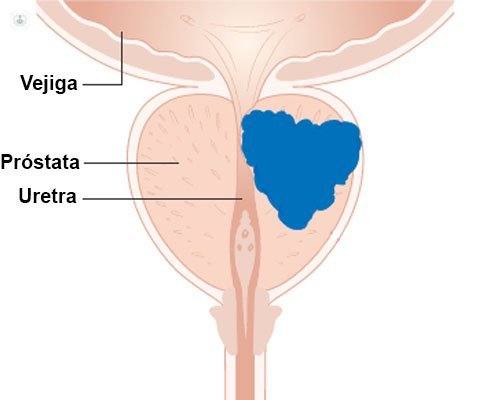Can you prevent prostate cancer?
Written by:Prostate cancer is the most common tumor among men, excluding skin tumors. The mean age at diagnosis is 68, rarely it appears before age 50. Since 1991, mortality has decreased and, in general, is very low thanks to early detection with PSA testing, although this is a topic discussed.
The vast majority of prostate tumors are called adenocarcinomas, ie, develop from the prostate glands. There is a precursor lesion of prostate cancer, which is detected in biopsies times that prostatic intraepithelial neoplasia is high grade.
Risk factors for prostate cancer
In the development of prostate cancer genetic and environmental factors influence. Although there is no specific gene involved in its development, there is strong epidemiological evidence suggests that there is a genetic component family. The risk of prostate cancer if you have a parent or sibling affected increases two to three times. Other factors involved in prostate cancer may be chronic inflammation and certain infections such as BK virus.
Other factors that have been implicated in prostate cancer are excess saturated fat in the diet or obesity. Unlike other cancers, it has not found a clear association with snuff or alcohol.

Prostate Cancer: Symptoms
Prostate cancer usually n or gives any symptoms until it is advanced. Once it is advanced, symptoms may be secondary to local growth (blood in the urine, urinary discomfort or urinary retention) or metastasis (bone pain or lymphatic edema of lower limbs). Most of the time the diagnosis is made early after a biopsy for a suspicious digital rectal examination or elevated PSA. In that case, no specific symptoms of cancer.
Prostate biopsy
The prostate biopsy is based primarily on the determination of a blood marker secreting prostate cells and is elevated in patients with this tumor: PSA or PSA. It is important to know that this marker is not specific to the cancer, but prostate. That is, a normal prostate, especially if there benign prostatic hyperplasia or prostatitis, can cause high PSA values.
It is therefore essential to correlate the PSA with the patient's age, increasing with age; with digital rectal examination, which can report whether or not there is a node or benign prostate growth; and the size of the prostate. The confirmation will be made by ultrasound-guided biopsy. In cases in which the diagnosis is uncertain , or is suspected despite previous negative biopsies, performing a parametric MRI and a biopsy fusion (using software that integrates images of resonance with ultrasound) identifies suspicious areas that should be biopsied.
Prostate Cancer: Treatment
When treating prostate cancer is essential to individualize each case. First, we must distinguish what is called high-risk cancer, low or moderate risk, according to criteria biopsy, PSA, etc.. Secondly, it is important to consider the age and life expectancy of the patient. According to these criteria, in patients older than 70 years with cancer of low risk, it is best not to try, but make what is called active surveillance through periodic determinations of PSA, DRE and even repeat biopsy if necessary. This is probably indolent tumors, which will not endanger the patient's life over the next ten years.
At the opposite extreme high - risk tumors found in patients younger than 70 years. In these cases it is indicated that active treatment, yes it is expected a benefit in cancer survival.
The standard treatment is radical prostatectomy, which involves the surgical removal of the prostate and seminal vesicles. The technique can be performed by conventional surgery, laparoscopic or robotic. The results depend more on the experience of specialist in urology that the technique used, although laparoscopic and robotic allow a somewhat faster recovery. Other alternatives are classic external radiotherapy, ie the application of radiation on prostate brachytherapy (implantation of radioactive seeds).
The problem with surgery is the high rate of erectile dysfunction, especially in radical prostatectomy if the nerves of erection walking adjacent to the prostate are not respected, and incontinence (usually mild and temporary). Radiation therapy also causes erectile dysfunction, although to a lesser extent; but may have other complications bladder rectal level (proctitis) and (micturition problems, Radica cystitis) etc.
In order to minimize complications and thanks to new techniques resonance and biopsy fusion, which have identified the tumor foci, have begun to use also focal therapies, such as cryotherapy (freezing) , ultrasound therapy (HIFU) or electrical therapy (electroporation).
Finally, locally advanced tumors or those at high risk, it is also necessary to associate a hormone treatment with drugs that produce what is called a chemical castration and, by themselves, are capable of stopping the disease for many years.
Can you prevent prostate cancer?
Prostate cancer is hormone dependent , ie, dependent on hormones for their growth. These hormones are androgens, particularly testosterone and dihydrotestosterone, which is the active metabolite. The use of drugs that block the conversion of testosterone to dihydrotestosterone been shown to reduce the incidence of prostate cancer occurrence in approximately 25%. The drawback of these drugs is that they can produce impaired sexual function.



